The Keeping Room: Old-Fashioned Concept, Modern-Day Comfort
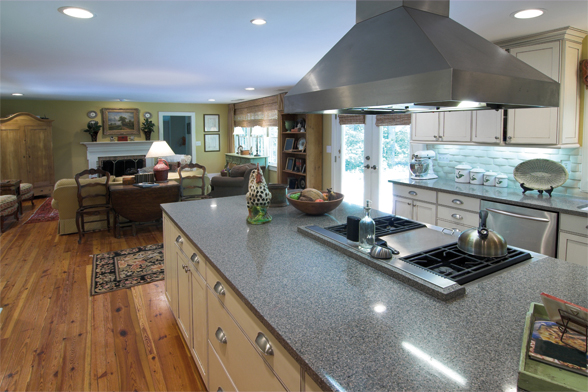 Recently a friend gave me a tour of her new custom-built home. “And here’s the keeping room,” she said, gesturing to a cozy, window-filled nook off the kitchen. Before I could stop myself from expressing ignorance of something I should really know, I asked her, “What’s a keeping room?” She said, with a laugh, “It’s the place where I ‘keep’ my mother and mother-in-law out of the way while I cook.”
Recently a friend gave me a tour of her new custom-built home. “And here’s the keeping room,” she said, gesturing to a cozy, window-filled nook off the kitchen. Before I could stop myself from expressing ignorance of something I should really know, I asked her, “What’s a keeping room?” She said, with a laugh, “It’s the place where I ‘keep’ my mother and mother-in-law out of the way while I cook.”
Indeed, a keeping room can be a way to keep people right where you want them, but its true origins date back centuries. Apparently I was asleep during that fourth grade lesson on American history; I have since learned that the concept of a keeping room dates back to Colonial times. In those days, the keeping room was located directly off the kitchen, which, because of the stove, was also the warmest room in the house. By day, families gathered here to do indoor chores—cooking prep, mending, laundry and the like—and by night would sleep there during the colder seasons. Here too they’d often have the last meal of the day.
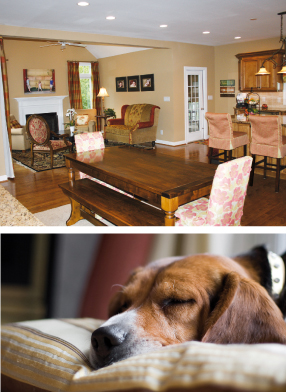 Over time, this space located off the kitchen has certainly evolved. Since Colonial times, our housework has become much more automated, and we’ve come to prefer separate spaces for our cooking and laundering and other everyday chores. But the idea of a keeping room has made a comeback in a big way—probably because we Americans love our kitchens, and we simply cannot resist anything that multitasks. Depending upon its size and scope, today’s keeping room can also be called a den, a family room, a sunroom, or a media room—but regardless of what it’s called, our love affair with kitchens means we simply must have living space nearby to nurture ourselves and our families. This modern-day keeping room is an essential part of keeping your home happy: keeping people together, keeping you organized, and maybe in some way, keeping your cool.
Over time, this space located off the kitchen has certainly evolved. Since Colonial times, our housework has become much more automated, and we’ve come to prefer separate spaces for our cooking and laundering and other everyday chores. But the idea of a keeping room has made a comeback in a big way—probably because we Americans love our kitchens, and we simply cannot resist anything that multitasks. Depending upon its size and scope, today’s keeping room can also be called a den, a family room, a sunroom, or a media room—but regardless of what it’s called, our love affair with kitchens means we simply must have living space nearby to nurture ourselves and our families. This modern-day keeping room is an essential part of keeping your home happy: keeping people together, keeping you organized, and maybe in some way, keeping your cool.
Keeping People Together
It’s true that the kitchen is the heart of the home, where the meals that sustain us are prepared, consumed, and swept away day after day. Given the amount of time and energy spent there, it’s great to designate a living and relaxing space that is close but separate. This is especially helpful while you’re entertaining, because you know what they say: during a party, everyone always ends up in the kitchen. A keeping room allows you extend the ultimate hospitality—providing a perfect space for your guests to mingle and remain in your sight and conversation, but keeping them away from the dirty business of prepping their party fare. For party time, make your keeping room guest-ready; extra seating and a coffee table clear of everyday clutter, with a bowl of munchies and a pile of pretty beverage napkins will encourage your guests to hang out there while you finish dinner. Always remember that this is meant to be a flexible space, so you may need to rearrange chairs just for the evening to open it up and make it more accessible.
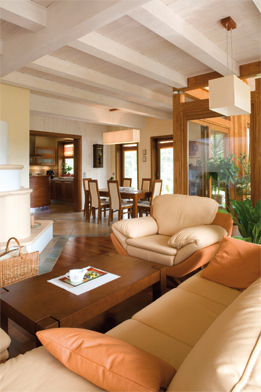 Even when it’s not party time, a keeping room is a great place for your family to be together. To this end, it’s important to outfit your keeping room with many comforts and inviting accessories. If kitchens are about hard edges and functional lines, a keeping room should be furnished with softness, comfort and durability in mind. Generously upholstered pieces in good-looking but tough fabrics, toss pillows and pretty throws are great additions to this space. This is also a great place for small, inexpensive accent tables to hold drinks and reading material. Keep young children entertained with one or two baskets of toys, books, puzzles or craft supplies specifically designated for that room, keeping the children in eyesight but not underfoot, and keeping these toys contained to this small area. A lap desk tucked to the side is perfect for school-aged children who want to do homework here, calling out questions while you peel potatoes. Your pets want to be close to you, but you don’t want to trip over them as you unload the dishwasher. A pretty dog or cat bed—so many cute options out there!— would be right at home in the keeping room as well, or a basket of their toys. A large, low cocktail table and generous floor pillows encourage post-dinner family game time as well.
Even when it’s not party time, a keeping room is a great place for your family to be together. To this end, it’s important to outfit your keeping room with many comforts and inviting accessories. If kitchens are about hard edges and functional lines, a keeping room should be furnished with softness, comfort and durability in mind. Generously upholstered pieces in good-looking but tough fabrics, toss pillows and pretty throws are great additions to this space. This is also a great place for small, inexpensive accent tables to hold drinks and reading material. Keep young children entertained with one or two baskets of toys, books, puzzles or craft supplies specifically designated for that room, keeping the children in eyesight but not underfoot, and keeping these toys contained to this small area. A lap desk tucked to the side is perfect for school-aged children who want to do homework here, calling out questions while you peel potatoes. Your pets want to be close to you, but you don’t want to trip over them as you unload the dishwasher. A pretty dog or cat bed—so many cute options out there!— would be right at home in the keeping room as well, or a basket of their toys. A large, low cocktail table and generous floor pillows encourage post-dinner family game time as well.
Almost any home, with any floor plan, can embrace the spirit of a keeping room by creating a cozy space in or near the kitchen. Even if you don’t have a room designated for this purpose—if you have walls separating your kitchen from your family room, or your eat-in kitchen is small—you can still adopt the feeling of a keeping room with a few simple changes. This may require that you bend—or break—some of what you may think of as design rules. Consider, first of all, ditching the concept of an eat-in kitchen. Use that dining room more than twice a year! (In my case, I would lose my mail/package/present-wrapping station on my dining room table, but that’s another story.) Take the table and chairs out of your kitchen, and put in its place a few overstuffed chairs and an ottoman or coffee table, and you are well on your way to a beautiful, comfortable keeping room of your own. Even a pair of simple slipcovered Parsons chairs tucked in the corner create an inviting conversation nook with a keeping room-feel in any kitchen.
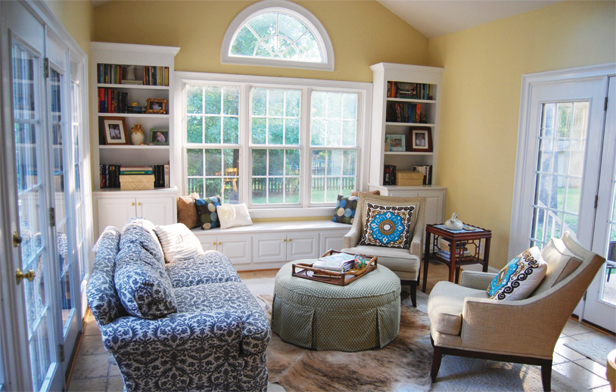 Keeping You Organized
Keeping You Organized
A keeping room is the perfect place for a great storage piece to house your table linens, whether it’s an armoire, a dresser or an antique dry sink. Because it is right within reach of the kitchen, you’ll never be tempted to skip pulling out your favorite tablecloth because it is hanging in a closet somewhere on the second floor. This is also a great place to get those platters out of storage and hang them—on the wall, or on a plate rack. You’ll be more likely to use and enjoy them if you can see them.
Since a traditional keeping room is usually an open space—only three walls, opening into the kitchen—make use of any wall space by incorporating built-in shelving or cabinets. Anything you store here will be within easy reach of the kitchen. Consider keeping your cookbooks, photo boxes and albums, and other craft supplies here. Board games and decks of cards should be kept here too. If bookshelves are part of your built-in configuration, pay particular attention to arranging their contents in a pleasing design—you’ll be looking at this area a lot from your kitchen, so make it count. Paint the back of the bookshelf in a fun, complementary color or use a gorgeous wallpaper (you won’t need much, so maybe you can splurge here!) to make the books and accessories on the shelves pop. Include some of your favorite family photos in an eclectic mix of frames among your book collection, and you’ll be smiling every time you do the dishes.
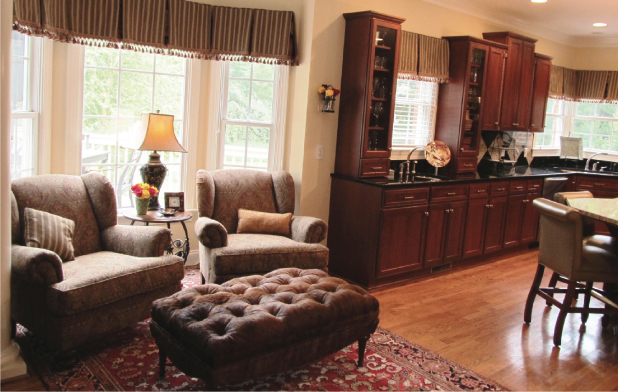 A keeping room is also a great place for your “to-do” pile — whether that is housed in a decorative accordion file, file box or basket. While many of us do have home offices, there are always those scraps of paper, those lists, those pieces of correspondence that need to be handled, that don’t quite make it to the home office. I keep these little “to-do’s” in a basket in my keeping room, and make it a habit, every few days or so, to sit down with this basket and spend a few minutes working through it. Thank-you notes, permission slips, reminders to sign a child up for a particular activity….I would much rather do all of that from the comfort of my couch than in my office. This habit has helped me tremendously with organizing a busy household and made some of the tasks more pleasant. Keep your basket stocked with notecards, pens and stamps, and maybe you’ll never miss a registration deadline again!
A keeping room is also a great place for your “to-do” pile — whether that is housed in a decorative accordion file, file box or basket. While many of us do have home offices, there are always those scraps of paper, those lists, those pieces of correspondence that need to be handled, that don’t quite make it to the home office. I keep these little “to-do’s” in a basket in my keeping room, and make it a habit, every few days or so, to sit down with this basket and spend a few minutes working through it. Thank-you notes, permission slips, reminders to sign a child up for a particular activity….I would much rather do all of that from the comfort of my couch than in my office. This habit has helped me tremendously with organizing a busy household and made some of the tasks more pleasant. Keep your basket stocked with notecards, pens and stamps, and maybe you’ll never miss a registration deadline again!
 Keeping Your Cool
Keeping Your Cool
My own keeping room, which I didn’t even realize was a keeping room until I toured my friend’s home (my builder called it a “morning room” – go figure!), is really my favorite room in the whole house. If I am not standing up in my kitchen, or asleep, I am usually sitting in my keeping room doing everything else I need to do. It tends to be the tidiest room in the house, because its furnishings, accessories and contents are simple and intentional. Everything I choose for this room is chosen with comfort and peace in mind.
Think about your keeping room as an almost-sanctuary, close to but separate from the business of every day life. A scented candle or a vase of flowers, an orchid or a houseplant all add touches of serenity to the surrounding chaos. A cashmere throw is the ultimate indulgence. Some may argue that a peaceful keeping room is no place for the TV, but others may say it’s the perfect place for one, allowing you to listen to the news while you cook or to watch a movie with your family. If music is your thing, include a dock for your MP3 player so you can wind down to your favorite tunes. Window treatments—even simple panels—can further soften the space without obstructing any backyard views you might have. Take it one step further and make sure the garden area right outside these windows is indeed a good one by planting a few favorite low-maintenance blooms there, strategically placing a pretty container garden, or installing a birdhouse in sight. If you have a fireplace in your keeping room like the Colonial folks did, lucky you! Invite someone to join you to relax and enjoy the soothing heat on a cold day.
Just like our ancestors’ keeping rooms, ours are meant to multitask in this busy, blessed world we live in. This room can mean different things to different households, but the basics hold true: outfit it intentionally, with flexibility and comfort in mind. Whether yours means keeping family close, keeping things organized, keeping your cool, or some combination of all these things, you will surely treasure this space in the heart of your home.






